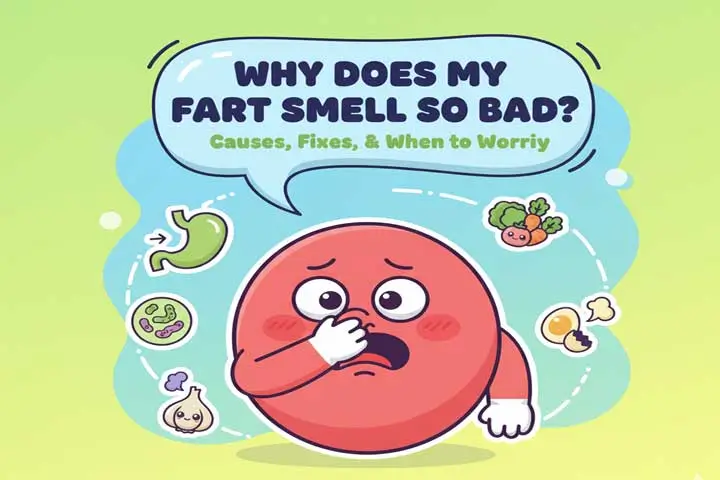We’ve all been there—you let one slip and immediately regret it. The smell is so strong you can’t help but think, why does my fart smell so bad? While it may be embarrassing, foul-smelling flatulence is more common than you think.
Gas is a normal part of digestion, but when odors become unusually pungent, it often has more to do with what you eat, how your gut bacteria break it down, and in some cases, underlying health issues. Let’s dive into the science (and humor) of stinky farts, explore the causes, and uncover ways to keep things under control.
What Causes Foul-Smelling Gas?
The Digestive Process Basics
When you eat, your body breaks down food in the stomach and small intestine. What isn’t fully digested travels to the large intestine, where trillions of bacteria get to work. These bacteria ferment leftover food particles, producing gases such as carbon dioxide, hydrogen, methane—and sometimes sulfur compounds that smell like rotten eggs.
Role of Bacteria and Fermentation
Not all gas smells bad. The foul odor typically comes from sulfur-rich compounds like hydrogen sulfide, methanethiol, and dimethyl sulfide. The balance of gut bacteria, the types of foods you eat, and how efficiently your body digests them all play a role in how strong the smell becomes.
Diet-Related Causes
1. Foods High in Sulfur
Sulfur is the biggest culprit when it comes to stinky flatulence. Foods high in sulfur include:
- Eggs
- Broccoli, cabbage, Brussels sprouts
- Garlic and onions
- Red meat and poultry
When these foods are broken down, they release sulfur-containing gases, giving your farts that rotten-egg odor.
2. Fiber and Carbohydrate Fermentation
Fiber is essential for digestion, but it also ferments in the colon, producing gas. Beans, lentils, and whole grains can cause bloating and odor. While not inherently bad, sudden increases in fiber intake often worsen gas temporarily.
3. Processed Foods and Artificial Sweeteners
Sugar alcohols like sorbitol, mannitol, and xylitol (often found in sugar-free gum or diet foods) don’t fully absorb in the intestine, leading to fermentation and smelly flatulence. Highly processed foods can also disrupt the natural balance of gut bacteria, intensifying odor.
Lifestyle Factors
Eating Habits
Eating too quickly, gulping down carbonated drinks, or chewing gum can make you swallow extra air, leading to more gas. While swallowed air itself doesn’t smell, it adds to the volume and can worsen bloating.
Lack of Hydration or Exercise
Dehydration slows digestion, and inactivity can make food linger in the gut longer, both of which contribute to gas buildup and stronger odors.
Medical Causes to Consider
Sometimes, smelly gas isn’t just about diet—it can point to an underlying digestive issue.
Lactose Intolerance
If your body can’t properly digest lactose (the sugar in dairy), bacteria ferment it instead, producing foul-smelling gas, bloating, and diarrhea.
Irritable Bowel Syndrome (IBS)
IBS can disrupt normal digestion and cause excessive gas, bloating, and unpredictable changes in stool.
Celiac Disease
People with celiac disease can’t tolerate gluten, leading to malabsorption, gut inflammation, and very smelly flatulence.
Gastrointestinal Infections or Imbalances
Infections or an overgrowth of harmful bacteria (dysbiosis) can alter fermentation, leading to putrid-smelling farts.
When Should You Be Concerned?
Occasional smelly gas is normal. But you should talk to a doctor if you notice:
- Severe or persistent bloating
- Abdominal pain or cramping
- Blood in stool
- Unexplained weight loss
- Frequent diarrhea or constipation
These could signal more serious conditions that require medical evaluation.
Practical Tips to Reduce Smelly Gas
Diet Adjustments
- Limit sulfur-heavy foods if they’re a trigger.
- Introduce high-fiber foods gradually.
- Avoid artificial sweeteners like sorbitol and xylitol.
Probiotics and Gut Health
Probiotics (found in yogurt, kefir, or supplements) help balance gut bacteria, potentially reducing odor.
Mindful Eating and Hydration
- Eat slowly and chew thoroughly.
- Drink enough water to aid digestion.
- Reduce carbonated beverages if bloating is an issue.
Natural Remedies & Prevention
- Herbal teas: Peppermint, chamomile, and ginger teas soothe digestion.
- Activated charcoal: Sometimes helps absorb odor-causing compounds, but should be used cautiously and not long-term.
- Regular exercise: Movement helps regulate digestion and reduce trapped gas.
FAQs
Why do my farts smell worse at night?
Digestion slows while you rest, allowing gases more time to ferment, which can make nighttime farts more pungent.
What foods make farts smell the most?
Sulfur-rich foods like eggs, broccoli, garlic, and red meat are the biggest culprits.
Can probiotics make my fart smell less bad?
Yes. By balancing gut bacteria, probiotics can reduce the production of odor-causing gases.
When should I see a doctor about smelly gas?
If gas is accompanied by pain, bloating, diarrhea, blood, or weight loss, it’s best to consult a healthcare professional.
Conclusion
So, why does my fart smell so bad? Most of the time, it comes down to your diet, the natural action of gut bacteria, and lifestyle habits. While foul-smelling flatulence can be embarrassing, it’s usually harmless and manageable with small changes.
The good news? Occasional smelly gas is completely normal. But if it’s persistent and paired with other symptoms, don’t hesitate to check in with your doctor. Until then, take a deep breath (preferably away from the source), laugh it off, and remember—everybody farts.

